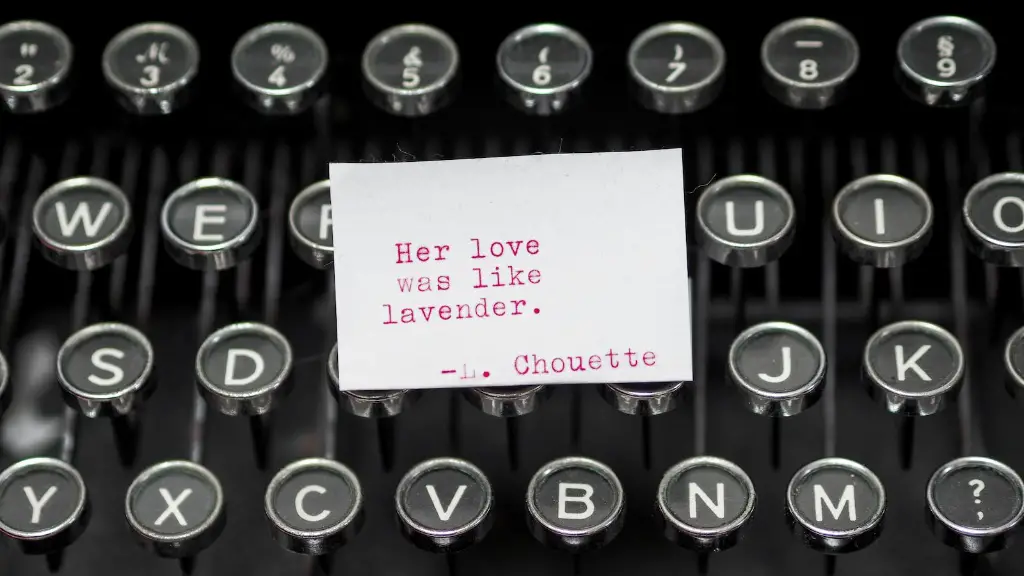Involvement in the Arts
Langston Hughes was one of the most influential figures of the Harlem Renaissance, a cultural movement that was born in the 1920s. Hughes was a poet, novelist, playwright and essayist whose works combined elements of jazz and blues to create a unique literary style known as the “Harlem Renaissance aesthetic”. He was also renowned for his activism, speaking out on social justice issues and actively promoting racial pride. As a result, he became a major voice of the Harlem Renaissance, and one of its most eloquent advocates.
Hughes was one of the first African American writers to earn widespread critical acclaim and a broad popular following. His poetry was published in major publications such as Crisis, The Nation, and Opportunity, while his novels were widely read. Among his most famous works are his books The Weary Blues, Not Without Laughter, and Montage of a Dream Deferred.
In addition to his literary accomplishments, Hughes was involved in the arts. He established a theater group, the Negro Artist’s Guild, to showcase African American talent, and was a major force in the Harlem art scene. He was also a contributor to the African American-focused magazine The Crisis, and he taught creative writing at both The New School and Columbia University.
Hughes was a prolific author, and his work played a significant role in developing a sense of African American cultural identity during the Harlem Renaissance. His stories, poems, plays and novels were celebrated for their celebration of African American culture, and he made it possible for African American writers to gain recognition in the literary world.
Hughes was also a major proponent of Pan-Africanism, a movement which aimed to unify African people around the world and promote a global black consciousness. He travelled extensively, and was particularly active in West Africa, where he was a strong advocate of decolonization and Pan-African solidarity. His experiences in West Africa were a major influence on his work and writing.
Connection with Music
Hughes was also closely connected with the music of the Harlem Renaissance. He was a keen listener to jazz and the blues, and his poetry often employed the rhythms and styles of these genres. Some of his most famous works, such as his poem ‘The Weary Blues’, drew heavily on the blues. He was also closely associated with the great jazz musicians of the period, such as Duke Ellington, Louis Armstrong, and Cab Calloway.
Hughes’ song lyrics, which he wrote for the musical Cabaret, were particularly influential in the development of American musical theatre. His influence extends to other musical genres as well, such as jazz and the Motown sound, and his musical contributions are influential to this day.
Hughes’ musical legacy is also seen in his legacy as a poet. He was a pioneer in the use of jazz forms and improvisation in poetry, and his influence on the genre is still felt today. He also had a major influence on the Beat Generation of the 1950s and 60s, an influential group of writers and poets who drew heavily on jazz music in their works.
Commitment to Social Justice
Hughes was a passionate social activist, and his works spoke out on numerous social justice issues. He called for an end to racial discrimination, and his poems and plays dealt with contentious topics such as poverty, racism, and segregation. His works often addressed the injustices of American society and highlighted the struggles of African Americans.
In addition to his literary works, Hughes took an active political stance in his writings and his public appearances. He was a vocal supporter of the civil rights movement and pacifism, and he was a champion for the rights of African Americans. He also campaigned for the right of African Americans to vote, and he was a strong advocate of Pan-Africanism.
His activism extended to the cultural arena as well. Hughes was a fervent promoter of African American culture during the Harlem Renaissance, and his work helped define and promote black pride throughout the world. He recognized that African American culture had its own distinct history, and he encouraged its celebration and recognition.
Legacy
Hughes’ legacy is felt throughout the world, and his works are still celebrated and studied today. His poetry and prose continue to draw readers, and his works still speak to people in a unique and powerful way. In particular, his writings on African American culture were a major influence on later generations of African American writers.
In addition to his legacy as an author, Hughes is remembered as a tireless advocate of civil rights and equality. His work helped to define a generation of African American writers and thinkers, and he was a passionate champion of black culture and identity. He was a visionary who inspired generations of African Americans and others to commit to social justice and racial equality.
Influence on Later African American Writers
Hughes’ works have been a major inspiration for countless African American writers and poets throughout the years. His works have been widely studied and his influence on later writers is undeniable. His works provide an important window into the African American experience of the Harlem Renaissance, and his works have shaped the narrative of later generations.
Alice Walker, for example, credits Hughes as a major influence on her writings, particularly his short story ‘The Blues I’m Playing’. Similarly, the novelist Toni Morrison has acknowledged his influence on her works, and rappers such as Talib Kweli have spoken out on his influence on their work.
The writer Esi Edugyan has said of Hughes “To read him is to know black people’s lives, our past, our hopes and fears, freedoms denied us without him having to set them down in so many words.” This statement is indicative of Hughes’ influence, and his significance to African American writing.
Role in the Harlem Renaissance
As one of the most important figures in the Harlem Renaissance, Hughes role in the movement was significant. His works were not only widely read but widely praised, and his fame grew rapidly. As a result, Hughes became a major advocate for the cultural movement, and he was instrumental in bringing attention to the works of fellow African American writers and thinkers.
He was one of the most vivid and passionate voices of the Harlem Renaissance, and his works were essential to its success. Hughes, then, is not only a major literary figure in his own right, but a major symbol of the Harlem Renaissance and all that it achieved.
Political Activism
Hughes was active in politics in both the USA and abroad, and was a tireless advocate for equality and civil rights. He was a vocal opponent of segregation, and was a major advocate for African American rights. He campaigned for voting rights and actively promoted Pan-Africanism.
In 1933, he joined the National Negro Congress, a civil rights group dedicated to challenging racism. Hughes was also close to the African National Congress and supported the move to decolonization in Africa. He even contemplated running for office himself, but abandoned those plans in order to continue his focus on writing.
Hughes’ legacy of activism lives on today, and his works remind us of our shared commitment to civil rights and equality.
The Harlem Renaissance and Langston Hughes’ Influence Today
The Harlem Renaissance was an important moment in American history, and Langston Hughes was a major figure in this cultural movement. His works are still widely read today, and he is remembered as a tireless advocate for civil rights and equality. His influence on African American writers is undeniable, and his legacy as a major figure in Harlem Renaissance literature lives on.
His work also continues to inspire us to fight for racial justice and for an end to inequality. His legacy reminds us that it is possible to use art to promote change and progress, and his works continue to serve as an inspiration for generations of African Americans seeking to make their voices heard.





